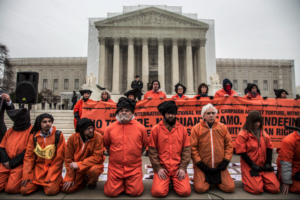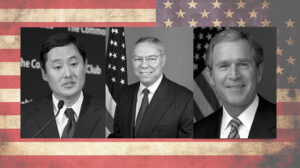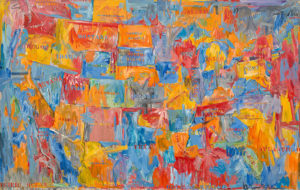Select Other Languages French.
In the age of "fake news" and post-truth, how can we tell the difference between a real conspiracy and government gaslighting? In this second edition of The Markaz Review’s monthly advice column, Souseh answers a letter from a reader, wondering how to handle her younger sister, who is enamored of conspiracy theories the writer finds questionable at best.
Dear Souseh,
For years now, my sister who is ten years younger than me has been mentioning various conspiracy theories she’s come across on social media. Recently she‘s become increasingly more vocal about some issues that her information seems to vindicate. This has only strengthen her beliefs. One example is the Covid virus; she says it began as a lab leak in Wuhan, China, something the Trump administration is now listing as a cause for the virus on US government websites. Another is the JFK assassination. After the tranche of files were declassified and released to the public, my sister argued that the CIA was involved in JFK’s assassination, and she believes that they are the same people who went on to form the Mossad in Israel. It is this historic relationship, she insists, that is at the root of the US government’s acquiescence to the Israeli government, no matter its actions. Many in our extended Arab family worry about the American government’s unwavering support for Israel; we are horrified that US tax dollars pay for the 2,000-pound bombs used against defenseless people in Gaza. We are baffled as to why US policy supports Israel but is it, as she insists, a deep state conspiracy?
Recently my sister and I were hanging out in her kitchen, and she was scrolling through social media. A lot of what she showed me on her phone was funny and we laughed together. I’m of a different generation and I don’t spend much time on social media, but what I did notice was that she relaxed with it after a grueling day at work and was thorougly entertained. I wondered if this letting her guard down had opened her mind to what I don’t want to call unsavory or stupid ideas, but ideas that are often questionable, or just plain odd.
She explained to me that what she really likes are “different perspectives.” Maybe I’m seeing everything in black and white but I said to her that some of the things she talks about were not “different perspectives.” There’s truth and there are lies. But admittedly I no longer know what to call the gray area in between. Can you help me? I love my funny, smart, politically engaged sister and don’t want her to disappear down the conspiracy rabbit hole.
Yrs, Black and White (and Gray)
Dear Black and White (and Gray),
In trying to figure out how to begin my response to you, I’ve reread your letter a number of times, and I keep coming back to one statement: “There’s truth and there are lies.” I think that before going anywhere else with this, we have to first parse out what you mean here by truth and what you mean by lie. There are some cases where the difference is stark and clear. If a window is open, for example, to say that it’s closed is a clear lie. To say that you are turning 34 when you’re turning 43 is another one. But that’s not the kind of truth you’re talking about here; not the truth you’re disagreeing on with your sister. On the surface, it appears to be a disagreement over the narratives, or rather the types of narratives that are socially and politically held to be self-evident by the vast majority of mainstream society. But beneath the surface of every clash or argument or falling out between a conspiracy theorist and those who love them is something more fundamental, and it’s why such discussions get so heated. Because they are disagreements over the nature of the world we inhabit. The pain you feel over disagreeing with your sister is the pain of realizing that you and this person you love so much — who is so “smart, funny and politically engaged” — do not quite inhabit the same world.
Inhabiting the same world means that you share a general sensibility, that most of your reference points, whether political, social, historical, moral and ethical, are, if not the same, then at least compatible with one another. Most importantly, the way you determine the parameters of your reality follow the same general logic. This is what feels so jarring: it’s not that each of you has a “different perspective” on the truth. It’s that the logic that determines your perspectives, the physical laws, so to speak, that underlie the universal constants by which everything in your respective worlds is ordered, are different.
In your world, the reasons behind why things happen as they do are mostly out there on the surface for all to see. They are reported and documented in a variety of media. In your world, people arrive at what they deem the truth by consulting a diversity of sources, weighing them against one another with differing levels of skepticism, and then forming a coherent picture of reality out of that composite. Even though you unequivocally state that “there’s truth and there are lies,” I would say that in your world, truth can be more malleable or relative, and part of its worth remaining contingent on the teller. In her world, truth is more absolute. There are larger, more singular forces that animate history, and the reason they aren’t out there for all to see is because they are deliberately kept hidden from people, so as to maintain the status quo.
In your world, people arrive at the truth through a form of consensus; in hers, that mainstream consensus is proof of the lie. The gullibility you ascribe to her for falling for conspiracy theories is no doubt the same one she ascribes to you for believing the sanctioned narratives.
And so perhaps it might help to think about why she believes what she believes. Conspiracy theories exist on a spectrum, from the plausible to the utterly outlandish, so I can’t speak to anything she might believe, save for the examples you gave here. For one, her belief about the genocide in Gaza. That it continues to be inflicted with such unrelenting evil because the Mossad controls the US, and I suppose by extension the entire Western world. Yes, it’s a theory that smacks of European antisemitism. But beyond that, if we are to give her the benefit of the doubt (which I do because you qualify her ideas as “questionable” or “odd” rather than “unsavory” or “stupid”), what’s the story she’s actually telling herself about the world here? It’s one in which most people in power would love to be able to do something to stop the genocide, except their hands are tied by nefarious forces. It’s one in which where she doesn’t have to contend with the alternative, which is that the authorities simply don’t give a shit, because they have economic and cultural ties to one another that they’d rather not risk, and while they could in fact organize and sanction and together stop the genocide in short order, they won’t even make the mildest statement of rebuke, or merely agree to comply with the ICC’s arrest warrants for the architects of this genocide. What is a more comforting, less senseless world to live in? One where genocide, ethnic cleansing, slaughter on the most depraved level can unfold in full view of the authorities over the course of going on two years and people simply get more, not less, used to it? Or one where there is a single and clear animating force behind everything, and thus an actual enemy to defeat?
It might also help to remember that we live in a world where some things that began as theories were then proved true conspiracies: For example, that the US orchestrated a coup in Iran in 1953 at the behest of the British who were incensed by Iran deciding to nationalize its oil. Or that for over 40 years the US government studied syphilis by withholding treatment from Black men in Alabama, while misleading them that they were receiving it. Or that the US was selling weapons to Iran in the 1980s in order to fund the Contras in Nicaragua and destabilize the country. It’s a lot easier to understand why people from those places under the boot of the American hegemon might believe in conspiracy theories. But the reason we now know that these were actual conspiracies is because conspiracies involve dozens and sometimes hundreds upon hundreds of people. They are difficult to keep secret, because, well, people talk! They slip up, they brag, they get drunk and spill the beans. And so, within a few short decades of each of these aforementioned events, the lies told by the powers that be were revealed to be just that: lies.
This is not to say that there aren’t things afoot that we don’t yet know about; that there aren’t large scale cover-ups that remain uninvestigated or, worse and far more likely, totally ignored. It’s much easier for the authorities to leave the truth plainly out in the open, counting on the fact that propaganda, as well as xenophobia, racism, nationalism, partisanship and just a blind belief in authority are all more than enough to keep people indifferent and deflect any public outcry. It seems to me, again, that a world in which horrors are exposed but ignored for systemic reasons, where all of us are to differing degrees complicit in maintaining a thoroughly banal evil is much more terrifying than one in which the only thing standing in the way of complete overhaul is if the sheeple would only wake up.
There are many different reasons and theories as to why conspiracy theories seem to be at an all-time high in our current day and age. Online communities have a lot to do with it: there are opportunities for many more people to congregate around a single issue, to form community out of common grievance and confusion, to egg each other on and share, sometimes outright manufacturing, evidence supporting their theories. The internet has also made it more difficult to parse credible from unreliable sources. Many people also have a thoroughly justifiable mistrust of the authorities, who, thanks to the internet, have finally lost their monopoly on the dissemination of information. But most crucially, there is now so much information out there that conspiracy theories are a way of organizing that chaos into a kind of order. A way of making sense and meaning out of the world, the way any system of faith, whether religious/spiritual or secular, gives us a ready-made way to interpret the bedlam of the world and organize it into a narrative we can live with, and which helps define our lives.
I conjectured earlier that your pain derives from the feeling that you and your sister inhabit different worlds. Let’s refine this for clarity’s sake to say rather that you subscribe to different systems of faith. What makes conversation difficult between people who subscribe to different faiths is, in many cases, not so much the clash between the narratives themselves, but the rigidity with which each believer approaches the other. Often the “conspiracy theorist” proselytizes with a near-religious, cultlike zealotry, trying to convince their loved one of their version of the truth. This is then met with the same level of zeal, and ferocious arguments ensue. I’m not saying you should be indulgent of ideas that contradict the moral and ethical values you hold most dear. But a worldview that leaves absolutely no room for doubt, no matter how convinced you might be of your own righteousness, makes life quite difficult. It doesn’t just impede our relationships with other people but also hampers our ability and capacity to change — our opinions, assessments, preconceived notions, expectations and ways of navigating through our lives.
Given the clear love you express for your sister here, your respect for her intelligence and humor, there seems to be room for some flexibility, a way to have a different kind of conversation, where you take a step back emotionally in order to rationally probe the reasons behind why she believes what she believes. What purpose do her beliefs seem to serve? What kind of story is she telling herself? How does this help you understand her better? If there’s space for you to ask questions, and you can equally make space enough for her to give you answers, even if they’re not the ones you want to hear, you might both be able to abandon your posts at the gates of your respective truths, to agree on the possibility of the gray area in between, and arrange your meetings on the territory there. That’s the territory where all human relations unfold; the only place they can unfold.
And if that proves totally impossible and civil conversation eludes you, you can always lie and then change the subject.


















